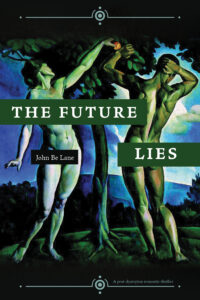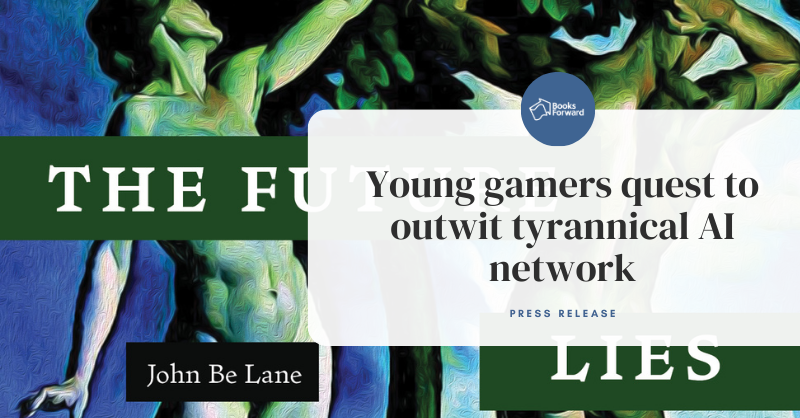“1984” meets “Ready Player One” in epic battle for humanity in YA sci-fi thriller
 Englewood, CO – Prepare to fight for humanity against a powerful AI network in the poignant fictional YA thriller debut from award-winning author, John Be Lane. The Future Lies (Feb 6, 2024, Global Arts Press) follows one brave gamer’s journey to thwart the domination of AI within this post-dystopian universe, where the Network controls every aspect of human life.
Englewood, CO – Prepare to fight for humanity against a powerful AI network in the poignant fictional YA thriller debut from award-winning author, John Be Lane. The Future Lies (Feb 6, 2024, Global Arts Press) follows one brave gamer’s journey to thwart the domination of AI within this post-dystopian universe, where the Network controls every aspect of human life.
Winner of the IPPY Award for Best First Book, John Be Lane returns with a propulsive science fiction thriller where humans struggle under the oppression of a “Big Brother”-style AI called “the Network.” Reflecting on current issues like authoritarianism, the casual surrender to technology, and AI’s growing popularity, John Be Lane creates a cautionary tale that asks the question, “what could happen if we continue down humanity’s current path?”
About the novel: In a time when people exist within an AI-created reality, Calvin, a young gamer, journeys beyond the walls of the game, “Kill It! Till It Die!” to find a place outside the simulated world. There he meets Juniper, a young woman who is horrified by the conditions Calvin and his friend Roscoe exist in. Literacy is a punishable offense, and the Network feeds nonsense to the huddled mass of “goners” on tablet-like devices called “slabs.” Juniper, Calvin, and Roscoe work together to free themselves and others from the Network. They’re met with a battle against the darker forces behind the world, and discover the deeper secrets about humanity hidden away in the Network’s CPU. The perfect haunting read on the future of humanity for fans of The Matrix, Black Mirror, and Ready Player One.
“The Future Lies”
John Be Lane | Feb 6, 2024 | Global Arts Press | Young Adult
Paperback | 978-0-9984356-7-1 | $18.99

John Be Lane’s first book, The Beatin’ Path – a lyrical guide to lucid evolution received a Living Now Evergreen Award as “one of the world-changing books published since the year 2000.” He lives in Colorado. Find out more about John Be Lane at his website.
Follow John on social media:
Instagram: @johnbelane
In an interview, John Be Lane can discuss:
- The process of writing Artificial Intelligence as a character
- Creating a cautionary tale that is grounded in the current dynamic between people and the digital technologies we’ve become dependent on
- The role of research and personal influences in shaping a fictional world
- Why literacy and critical thinking are such existential threats to authoritarians
- What surprised him as he wrote the book, and what he learned about it after it was finished
- His previous work as a writer and how it informed his transition to writing for a YA audience
- The tension of duality (life/death, oppression/resistance, and humanity/technology) and its impact throughout the book
An Interview with
John Be Lane
1. What inspired you to write a novel for a young adult audience, especially about artificial intelligence control?
I didn’t consciously set out to write a novel for a young adult audience. My intention was to shine a light on certain dangers of the world we live in, and how they might play out. But the people who have the most at stake in all of that are young adults, so the story needed to be told from their perspective. For a long time, I’ve worried that Artificial Intelligence might be the apex, “Game Over” predator of humans. But I didn’t dream the topic would become so imminent quite so suddenly.
2. To what extent do the events and context of the novel reflect current realities?
I don’t think it’s hard to see that human capitulation to digital technology is pretty far along. A lot of people have embraced AI as quickly as they took to cryptocurrency and that whole world. But convenience often has a cost that people just don’t stop to think about. It seems like a slice of self determination is lost with each new line of code. We’re approaching an inflection point in which our range of possibilities will be limited to only that which is permitted by an application on our cell phones.
3. How did your experiences as a screenwriter and poet influence the way you wrote the book?
The Future Lies is my first extended narrative, and so I had to figure out how I could tell the story. Screenplays are scene-based, and with that in mind, I broke the story into distinct and shorter moments, which I think contemporary readers might appreciate. Screenwriting also taught me the classic “show, don’t tell,” along with story arc, characterization, and dialog. From poetry, I’d like to think I learned how to channel emotion into storytelling. And the prose came out with cadences very much like how I’d write a poem.
4. What was your process when writing the story, developing the characters, and creating the premise of the book?
It started out not as a book, but as a radical rethinking about how education could be improved. But launching a charter school sounded like more of a challenge than I could handle, and I thought that maybe I could make the bigger points through storytelling. I walk a lot, and as I walked, the scenes and characters began emerging in my mind – kind of like the first stars of the evening. Gradually, the points of light formed constellations, which became the outline of a story. As the pieces of the story fall in place, the characters acquire their own agency, and they tell you what happens next.
5. What do you hope for young readers to take away from your novel?
To question everything. To not be passive spectators of what happens in the world, but to engage, and never to assume that those in power are entitled to their power, or that they’re acting in good faith on your behalf. That there are other ways of imagining the world than the ways that they’ve inherited. That literacy, critical thinking skills, and a passion for learning are the keys that unlock the one potential superpower that humans actually have – that is, a working mind. The more young people who learn to use their minds, the better chance we’ll have.

A former award-winning journalist with national exposure, Marissa now oversees the day-to-day operation of the Books Forward author branding and book marketing firm, along with our indie publishing support sister company Books Fluent.
Born and bred in Louisiana, currently living in New Orleans, she has lived and developed a strong base for our company and authors in Chicago and Nashville. Her journalism work has appeared in USA Today, National Geographic and other major publications. She is now interviewed by media on best practices for book marketing.

